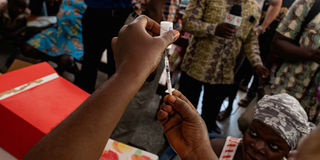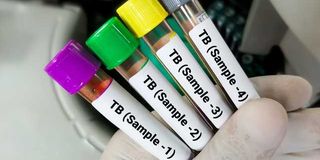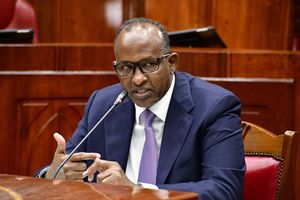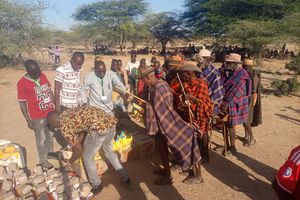Kenya’s 'sick' healthcare system becomes Duale’s headache

Kenya's health system is facing a serious crisis as Aden Bare Duale takes over at Afya House.
What you need to know:
- Kenya's health system is facing a severe crisis, with HIV patients struggling to access ARVs, TB cases going untreated, women going without family planning methods due to stock-outs, and challenges with the implementation of the Social Health Authority (SHA).
- The crisis is largely due to funding shortfalls from donors such as PEPFAR, delayed government reimbursements to hospitals, and the government's failure to meet its co-financing obligations for essential programmes such as child immunisation.
- The situation is exacerbated by the potential loss of critical health data, with the closure of a major US-funded programme threatening to disrupt health planning and key monitoring systems.
Kenya is in the grip of a severe healthcare crisis that is endangering millions of lives.
From HIV patients struggling to access life-saving antiretroviral drugs (ARVs) to tuberculosis (TB) cases going untreated due to a lack of testing reagents, to women seeking family planning methods forced to either pay exorbitant prices for the methods at private facilities or forego contraception altogether, the situation paints a dire picture of a system that is failing its people.
The government’s failure to properly implement the much-hyped Social Health Authority (SHA) has further compounded the crisis, leaving patients stranded and hospitals cash-strapped.
“If immediate action is not taken, Kenya risks reversing decades of progress in public health. The Ministry of Health must move with urgency to address these issues, restore funding, and ensure that every Kenyan has access to the healthcare they need,” Dr Davji Atellah, Secretary General, Kenya Medical Practitioners and Dentists Union.
He adds: “Across the country, health systems are crumbling under the weight of supply shortages, funding gaps, and policy failures. Until then, the country remains in a state of medical emergency, with the most vulnerable paying the highest price.”
As Aden Bare Duale takes over at Afya House, Nation.Africa takes a deep dive into what is ailing Kenya’s health system.
SHA: Failing in execution
Since the rollout of the Social Health Authority (SHA) in October 2024, the system has faced major challenges, including delayed government reimbursements that have left many private and faith-based hospitals in financial crisis.
As a result, some facilities have suspended SHA services, scaled down operations by up to 82 per cent or begun turning away patients who cannot pay out of pocket.
A study by the Rural and Urban Private Hospitals Association of Kenya (RUPHA) found that one in four private hospital owners is considering selling due to the crisis.
The report, based on a survey of 157 facilities across 30 counties, highlights that clinical services, particularly in Level 2 and 5 hospitals, are the most affected.
Non-clinical staff in administration, housekeeping, and food services have also been significantly reduced.
RUPHA Chairman Dr Brian Lishenga warns that without urgent reforms in financing, regulation, and workforce protection, Kenya risks losing critical frontline healthcare providers.
Mr Duale, in his post about being moved from the environment ministry to that of health, promised to make universal health coverage his main priority to “guarantee equitable healthcare access, especially for vulnerable populations.”

Kenya and South Africa have led the region in increasing the number of people taking pre-exposure prophylaxis (PrEP), a drug used by HIV-negative people to prevent the virus.
HIV/AIDS
Patients across Kenya have been left stranded without essential HIV medicines, as hospitals begin rationing drugs due to severe shortages.
Where patients once received three-month supplies, they are now given only two weeks' worth, with uncertainty over when new stock will arrive.
The crisis stems from Kenya’s long-standing reliance on donor funding—particularly the US President’s Emergency Plan for AIDS Relief (PEPFAR)—which has recently been paused.
This has left 1.4 million Kenyans living with HIV at risk, as a month’s supply of ARVs can cost over Sh10,000, an unaffordable amount for most.
The disruption threatens to cause drug resistance, higher mortality, and increased transmission rates.
The World Health Organization has warned that Kenya is among the countries in danger of running out of HIV drugs. WHO Director-General Dr Tedros Adhanom Ghebreyesus cautioned that halting PEPFAR support has immediately disrupted HIV services in over 50 countries.
He warned that the interruption could reverse 20 years of progress, potentially leading to over 10 million new HIV cases and 3 million related deaths—more than triple last year’s figure. Dr Tedros urged the US to reconsider the funding suspension or at least coordinate with affected countries to ensure a smooth transition.
He challenged: “Whether or not U.S. funding returns, other donors will need to step up, but so too must countries that have relied on US financing, to the extent they can. WHO has long called for all countries to progressively increase domestic health spending, and that is now more important than ever,” said Dr Tedros.
Immediate former Health Cabinet Secretary Dr Deborah Barasa last week said there was no cause for alarm, yet.
“Over 4.8 million packs will be delivered between now and June 2025, which will increase Central-level stocks to over 11 months of stock by the end of June 2025.” said Dr Barasa.

The conference, which starts Monday and will run until the end of the week, is co-hosted by the Bill and Melinda Gates Institute for Population and Reproductive Health.
Women’s health at risk: Family planning shortages
Kenya is facing a severe contraception crisis due to a nationwide stockout of essential family planning commodities, largely caused by funding shortages.
The country requires Sh2.5 billion annually to sustain its family planning program, but underfunding has left clinics with empty shelves, especially in rural areas.
As a result, many women are either forced to buy contraceptives from private facilities or go without—risking a rise in unintended pregnancies, unsafe abortions, and maternal deaths.
The situation has been exacerbated by the suspension of US government funding through PEPFAR, which previously supplied 24 per cent of Kenya’s contraceptive stock.
The government has yet to step in to fill the gap, leaving millions of women vulnerable.
Nelly Munyasia, Executive Director of the Reproductive Health Network, criticized the slow government response, saying, “The lack of planning and slow response from authorities have turned what should be a fundamental health right into a privilege accessible only to those who can afford private healthcare.”
Sham Musyoki, Health Systems Strengthening Supervisor at Marie Stopes International Kenya, noted that the supply of family planning commodities has been erratic across all counties for the past six months.
He identified implants and combined oral contraceptives as the most affected products.
“We may see an increased rate of unintended pregnancies, school dropouts, and complications from unsafe abortions, leading to death,” he warned.
Musyoki also emphasized the added burden on rural women, saying, “Already burdened by the current economic hardships, they are now forced to buy family planning services at private facilities.”
Former Health Cabinet Secretary, Dr Debra Mulongo Barasa requested the National Treasury immediately disburse additional resources to stabilize disrupted programs;
The program’s commodities are financed through three channels: the Government of Kenya (GOK), UNFPA, and the US government.
“Under the current stop-work order, no waiver has been granted to continue distributing the USG-supported commodities, leading to critical challenges including the current supply of family planning commodities, which is less than five months, well below the required 15-month minimum, creating an urgent need to boost stocks,” she says.
“Kenya requires Sh2.5 billion annually for family planning commodities, out of which Sh504 million is funding from the government, Sh222 million from the Global Fund, and Sh598 million from the US government support. The deficit is Sh1.7 billion,” she said in an analysis report on the impact of the US government's stop work order.

A nurse holds a syringe as patients wait in Ghana, April 23, 2019. Gavi/2019/Tony Noel. Picture taken April 23, 2019. Zipline drones, supported by Gavi and the UPS Foundation, cut the time taken to deliver lifesaving medical supplies from hours to minutes.
Co-financing obligations not met
There is also the issue of critical shortages of routine childhood vaccines as the government delays payment of its Sh2.8 billion co-financing obligation to the Global Fund and GAVI, due by June 30, 2025.
The country’s immunization program depends on this co-financing agreement, which supports vaccine supply in low-income nations. Under the arrangement, Kenya is responsible for fully financing key vaccines including BCG, Polio (oral and injectable), Hepatitis B (birth dose), Tetanus-Diphtheria, and DTP.
The failure to meet this commitment is hitting low-income families hardest, as public health facilities struggle to maintain routine immunization. Experts warn that if Kenya is locked out of vaccine procurement and cannot self-finance, it will reverse years of progress in child health.
“If we are going to lose children to preventable diseases like polio, it means Primary Health Care has failed, and therefore achieving Universal Health Coverage will not be realized by 2030,” one expert told Nation.
Dr Barasa last week told the Nation that the government was in talks and would have a comprehensive response plan to the matter in the coming week.
She said the government will explore and implement innovative co-financing models that enable both the government and private partners to share the financial responsibilities of sustaining essential health programs, thereby creating a more balanced and resilient funding framework.

Blood samples to be tested for tuberculosis.
Tuberculosis: A silent epidemic
TB drugs are running out, and testing for the disease has been nearly impossible in many public hospitals for the past five months due to a lack of reagents.
Kenya is one of the high-burden countries for Tuberculosis, yet the disease is being neglected due to a critical shortage of essential medications.
Already, for the last three months, hospitals have not been able to test for TB. Hospitals are reporting a massive backlog of untested sputum samples, leaving hundreds of suspected patients stranded without diagnosis and treatment.
For the past 90 days, sputum samples collected from patients have remained unprocessed. The abrupt US funding freeze, which took effect in January, has crippled essential diagnostic services, pushing Kenya’s TB response to the brink of collapse.
Without proper testing, many TB cases are going undetected, exacerbating the spread of the disease. The ripple effect of this shortage means that Kenya could see a resurgence of drug-resistant TB, which would require more expensive and prolonged treatment.
In an impact report released last week signed by the former Health Cabinet Secretary, it highlighted that the TB program faces a daunting 69 per cent funding gap.
“While the KEMSA pipeline currently meets immediate needs, the long-term viability of TB interventions is in serious jeopardy without urgent financial intervention. The TB program operates on a similar multisource funding model,” Dr Barasa said.
Lack of data to know the disease burden in the country
Kenya risks losing vital health data and insight into what is killing its people if the government does not invest in data collection following the closure of a major US-funded program. The Kenya Demographic Health Survey (KDHS), conducted every five years and led by the Kenya National Bureau of Statistics (KNBS), may be disrupted after the U.S. Agency for International Development (USAID) halted funding due to a foreign aid freeze.
The KDHS provides crucial national and county-level health and population data used for planning, monitoring, and evaluating key programs. Without this data, health services and digital systems such as Kenya EMR (HIV records), CHANJO Ke (immunization tracking), DAMU Ke (blood donation data), the Kenya Health Information System, and HIV drug adherence monitoring tools could be severely affected.
An impact assessment report warns that without continued funding, Kenya may struggle to maintain or upgrade these systems, jeopardizing public health planning and the shift to locally managed infrastructure.





